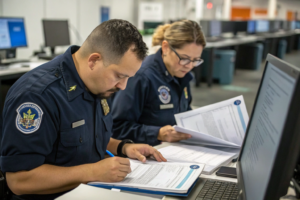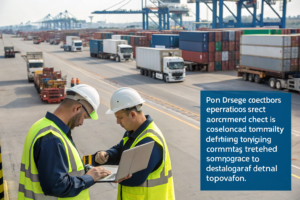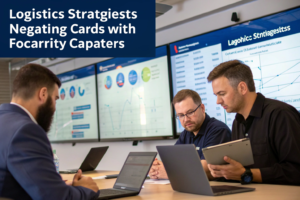Shipping from Asia to the West can feel overwhelming. Customs regulations, port congestion, and unclear communication often lead to shipment delays or rising costs. Many importers underestimate how these challenges compound without the right logistics partner.
Professional freight forwarding matters because it transforms chaos into control—offering clarity, coordination, and cost savings throughout the global supply chain.
If you’ve ever faced late deliveries, surprise charges, or missing updates from your logistics provider, working with an experienced forwarder isn’t just helpful—it’s essential.
How do freight forwarders simplify international shipping?
Freight forwarding companies remove guesswork from complex shipping logistics.
They coordinate every step: booking transport, handling customs, managing documents, and ensuring on-time delivery from origin to destination.
Shipping goods from China to the U.S. involves many moving parts, but professional freight forwarders are trained to manage them all efficiently.

What key roles do forwarders play in the shipping process?
A good forwarder does more than just book space on a ship. They organize cargo collection from factories, check packing, prepare all export documents, and secure space on the right vessel or plane.
They also ensure compliance with destination country regulations. Whether it’s labeling, customs forms, or commercial invoices, they’ve got it covered. Their connections with port officials and shipping lines allow them to act quickly when things change, preventing losses for clients.
How do forwarders help avoid customs clearance issues?
Delays at customs are often caused by incorrect paperwork or misclassified goods. Experienced forwarders work with you to ensure your HTS codes are accurate, and that declarations match the cargo.
They also understand the entry processes at both Chinese ports and U.S. terminals like Long Beach or Savannah. For example, if a product faces unexpected inspection, your forwarder can arrange bonded storage or help contest excessive tariffs with supporting documents.
What benefits do professional forwarders offer over DIY shipping?
Trying to handle logistics alone may seem cheaper—but hidden costs add up fast.
Professional freight forwarders save time, money, and headaches by preventing errors, optimizing routes, and securing better rates.

How do forwarders reduce shipping risks and costs?
Because forwarders manage hundreds of shipments monthly, they negotiate bulk rates with carriers—whether it’s ocean freight or air cargo. These discounts are passed on to clients.
They also avoid unnecessary surcharges by optimizing container loads or splitting cargo when needed. For instance, sending two partial loads from Qingdao and Shenzhen may be cheaper than waiting for one full load from Shanghai during peak season.
What happens if you don’t use a professional forwarder?
Without a reliable partner, you may face warehouse backups, missed vessel cutoffs, improper insurance, or tariff miscalculations. Each mistake can lead to serious financial impact.
For example, using the wrong INCOTERM or failing to book timely DDP service may result in delays or disputes. A forwarder eliminates these blind spots.
Why is experience critical in freight forwarding?
Shipping is not just logistics—it’s strategy. And strategy requires experience.
Experienced freight forwarders understand global supply chains, trade regulations, and the urgency of business-to-business shipping.
Years of handling cargo between China and the U.S. builds the instincts and network that no software can replace.

What kind of experience matters most in a forwarder?
Look for companies with long-term service on specific trade lanes. At GeeseCargo, we’ve spent years managing U.S.–China and U.S.–Europe routes. That means we already know the seasonal slowdowns, the port-specific procedures, and the right contacts to resolve issues fast.
We also understand industry-specific needs. Whether you’re shipping apparel or electronics, we anticipate what documents, tariffs, and handling procedures are necessary.
How do experienced forwarders handle disruptions better?
Weather delays, factory production overruns, or new customs rules—these happen all the time. The difference is how fast your forwarder responds.
Professionals maintain backup plans, alternative carriers, and port contacts to keep shipments moving. During COVID, when L.A. ports backed up for weeks, we rerouted clients to Oakland or Seattle with minimal delay. This kind of agility only comes from experience.
What does a reliable freight partner look like?
Not all forwarders are equal. The best ones deliver consistency, trust, and a sense of control.
Reliable forwarders communicate clearly, act fast, and build long-term partnerships based on performance.
Ron doesn’t want a new agent every shipment—he wants a trusted logistics partner.

What are signs of a trustworthy forwarder?
Transparency, clear pricing, good references, and on-time delivery history are all must-haves. Do they offer shipment tracking? Can they explain your quote in detail?
Also, do they speak your language—literally and operationally? At GeeseCargo, we offer bilingual support and U.S.-time-zone response, which means you never wait overnight to solve an urgent issue.
How do forwarders become part of your supply chain?
When a freight partner understands your product cycle, warehouse needs, and risk tolerance, they begin operating as an extension of your sourcing team. They anticipate problems, align with your peak seasons, and help optimize inventory planning.
This kind of integration ensures consistency across shipments—making your supply chain stronger and more resilient.
Conclusion
Professional freight forwarding is not a luxury—it’s a necessity for modern importers. From preventing errors to accelerating delivery, reliable forwarders like GeeseCargo turn unpredictable global trade into a streamlined experience. For American buyers like Ron, it means faster inventory, fewer surprises, and more peace of mind with every shipment.









